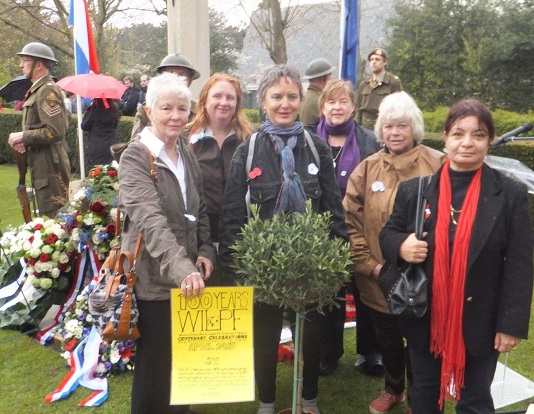
Late April witnessed three centennial events related to WW1, all happening in the same week 100 years ago: the international Congress for Women at the Hague (April 28), the use of chlorine gas by Germans at Ypres, Belgium (April 22), and the start of the British and ANZAC (Australian- New Zealand Army Corps) attack on Gallipoli, in Turkey (April 25).
While celebrating the first – the founding event of the Women’s International League for Peace and Freedom – I was invited to attend a centennial commemoration of the last at a cemetery outside the Hague.
On Saturday, April 25, a New Zealand Wilpf member, Liz Remmerswaal Hughes invited me to a solemn ANZAC graveside ceremony sponsored by the embassies of Australia and New Zealand in the Netherlands. It was the 100th anniversary of the start of the disastrous invasion of Gallipoli early in WW1 when 11,500 Australian and New Zealand soldiers died due to the irresponsible decision of Winston Churchill to extend WW1 to the eastern Mediterranean.
Gallipoli was an event that has seriously impacted Liz’s family. She felt impelled to witness; she could no longer contain the fury and sadness she felt, not just at the senselessness of the degradation and killing that occurred there but at the twisting of historical memory that has turned the event into a foundational patriotic creation story: the ‘birth of two nations’ and a justification for building common cause with the rest of the “Commonwealth.”
Liz’s maternal grandfather, Gustav Victor Bergh, was too young at 16 to join the NZ army in 1915, so he joined the Australian army. He was gassed at the Somme, in France, but returned to marry his sweetheart, Lizzie.
Like many soldiers, he never spoke about the war, but his health was poor because of the war and he died in his 50’s.
Liz’s other grandfather, Jackie Gethin Hughes, born 1866, was already a soldier who had served in the Boer War for the English when WW1 broke out. He went to fight at Gallipoli and remained there for a hellish six months – one of the longest serving officers at Gallipoli. According to Liz, “He was a much loved and respected man who cared for those around him in the terrible circumstances of constant bombing and poor conditions.”
He spent six months convalescing in a British hospital before he was fit enough to go home to his young family. After his return, his health broken, he was discharged as unfit for service a year before he was due for his pension, which was difficult and demoralizing. However he led the Anzac day parade in his Wellington hometown until he died in his 80s.
Twenty four years later, Liz’s own father, Pat Hughes, volunteered to fight Hitler and served in North Africa and Italy. However he had no illusions about war.
“These things that happen to families – the ill health, the pain and suffering – the price that is paid decades later – there is no glory to it,” Liz said.
Liz and her New Zealand and Australian friends wanted to mark the occasion for WILPF.
They bought an olive tree, symbol of peace, and after not hearing back from the New Zealand embassy in response to a request to plant it somewhere, decided to bring it to the ceremony anyway, and work out what to do from there.
There was a large crowd standing in a dispiriting drizzle around a stone monument, and one could hardly hear the voice of the NZ ambassador commemorating the disastrous event.
Fortuitously, after all the official wreaths were laid by the gathered ambassadors and military organizations, there was a call for others present to lay their tributes.
I didn’t know what was planned, but Liz whispered “just follow me” (which I didn’t) and she and three other WILPF members picked up the tree that they had secreted in a corner of the performance area and seamlessly took part in the ritual.
None of the officials or well-dressed onlookers seemed to mind these informally dressed knap-sacked women taking part in the ceremony, in fact it felt as if the women were expressing a truth that the other participants were restrained for patriotic reasons from expressing.
The way this disastrously planned and executed battle of WW1 has come to be seen as the occasion for the ‘birth of two nations’ – as it was announced over television – rather than as an occasion for revulsion from war and from the nation state, and from the commander – Churchill – who ordered the deaths of their best and brightest – is a most successful perversion of history in the interests of military elites to maintain the power of the state by glorifying the sacrifice of war. I wonder whether the women of Australia and New Zealand were involved in the decisions to exalt this painful historical moment into an occasion for national pride. No doubt they would want their sons and husbands to be remembered, but perhaps not this way.
Watch for the film the Water Diviner, starring Russell Crowe, about an Australian farmer’s trip to Gallipoli in 1919 in search of his three sons, just released for the centennial events.
